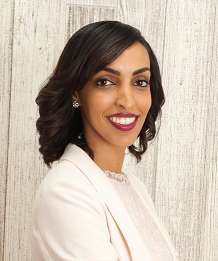This month’s professional spotlight features Rahel Jerusalem Kifle. Rahel serves as Associate Counsel for the Washington Suburban Sanitary Commission (WSSC), one of the largest water and wastewater utilities in the country. Read this month’s spotlight to learn more about Rahel, her work, and how she gives back to the community.
Could you briefly explain some of your responsibilities in your current career role.
WSSC is responsible for supplying water service to nearly 2 million people across two major counties in Maryland. My role is distinct from the traditional lawyer’s because I serve in an in-house capacity, which means I’m based within the organization I serve. This allows me to take on responsibilities that go beyond the conventional practice of law and the typical attorney-client relationship. For example, I play an active role in guiding WSSC’s business decisions, shaping its policies and procedures, and advising of potential legal risks in its operational practices. It’s a very hands-on partnership. The other aspect of my work looks much more conventional. I get to put on my litigation cap and represent WSSC in various administrative, state, and federal courts. The cases I handle primarily involve torts and personal injury claims, contractual disputes, employment discrimination, and regulatory issues. No two days are alike, which is what I love about my job. It keeps me on my toes!
How did you come to decide that this was the right career path for you?
This question always makes me laugh because the truth is, I didn’t have a pivotal moment when I decided that law would be the “right career path” for me. It was a gradual realization that was born out of my desire to help others. I come from a low-income, minority immigrant background where the vast majority of my relatives are uneducated. Ultimately, it dawned on me that a legal education could be a powerful tool in advocating for members of my community who are often disenfranchised and exploited due to their ignorance of the law. I realized that I could use the legal profession to sort of level the playing field in small but meaningful ways. I could empower friends and family by educating them about the rights and protections afforded to them under the law. I could provide quality advice and representation to community members who might not otherwise be able to afford an attorney. I could access circles of influence that people of my background would ordinarily be cut off from, and offer a perspective that is representative of the marginalized. I could be the resource I wish I had growing up. All of these considerations ultimately drove my pursuit of a career in law.
Is there a philosophy that drives your career?
Be just as faithful in the small things as you are in the greater things. I try to hold myself accountable to this standard. It reminds me of the importance of being diligent, committed, and hard-working, even in the seemingly insignificant or mundane aspects of my work. It yields a form of professional integrity and humility that I believe is crucial to leadership on the job and in life. A lot of people hang on to the mistaken belief that professional success happens as a result of putting a lot of energy into the big, make-it-or-break-it opportunities; but I think that’s only half of the equation. More often than not, lasting success is a product of extraordinary discipline that is cultivated by how one handles the ordinary, day-to-day tasks that go unrecognized. If you’re faithful in the small things, you’ll unquestionably work just as hard, if not harder, at the things that matter most.
What do you consider to be your greatest professional accomplishment?
My greatest professional accomplishment is one that occurred early on in my career. I had the privilege of representing an Ethiopian man who was seeking asylum in the U.S. due to being persecuted for his political activities in his homeland. His case required creative legal arguments because there were several factors that had the potential of automatically disqualifying him from being asylum-eligible. Despite the legal obstacles, I was able to successfully argue his case in court and secure his status as a protected asylee. I’ll never forget the look of relief and gratitude on his face when he realized he was no longer in danger of being deported to Ethiopia and possibly killed as a result. It was an extremely gratifying experience, both on a professional and personal level, as my family and I also immigrated to the United States as refugees. It was a full circle moment to be able to help someone in a similar position. I treasure that experience to this day.
What’s one piece of advice you would give someone looking to transition into your line of work?
I have a few. First, I would advise any aspiring lawyer to keep an open mind about what their future practice area might look like. The reason is simple: interests change. What you think you want to specialize in when you first enroll in law school may change as you become exposed to new and varied areas of law. Law school is your time to experiment. Take that intellectual property course even if you’re convinced you’ll ultimately practice family law. Sign up for a mock trial competition even if you think you have zero interest in litigation. Apply for a summer internship at an immigration law firm even if you suspect that you’ll do criminal work in the future. Diversify your interests and your skill set! Not only will it prevent you from being pigeonholed should your interests change in the future, it will make you much more prepared for a competitive job market upon graduation. Secondly, I’d highlight the importance of forging meaningful relationships during law school. Your professors are an invaluable resource. Whether it’s for mentorship purposes, letters of recommendation, or leads on potential jobs—utilize them! They’re there to help. It’s important to connect with your classmates, too. Everyday you’ll be in class with people who will be the future prosecutors, defense attorneys, expert witnesses, mediators, and judges for your future cases. Get to know them and treat them professionally! The impression you make in law school will follow you. One final piece of advice: be mindful of interest rates on student loans. You don’t realize how predatory some of those loans are, and how limiting they are to your selection of future job opportunities, until you graduate and have to pay them back! And to the extent possible, say no to the bar study loan! Trust me on that one.
As we enter the holiday season, what are some ways you practice giving back to the community?
Great question. As a Christian who has received much grace over the course of my life, I try to make it my personal responsibility to extend the same grace to others. Sometimes that looks like volunteering at my local food pantry, assembling and distributing care packages to the homeless, or sponsoring a family in need. Other times it looks like actively serving at my church. As the co-leader of my church’s Women’s Ministry, I send out weekly devotionals to inspire and encourage women through the various challenges they face every week. Giving back also includes using my professional skills for the benefit of others. I try to do that by taking advantage of pro bono opportunities through my local bar association, being “on call” for friends and family who need legal advice, and mentoring first generation law students through EDN.
Outside of all of your hard work and efforts toward building your brand, what do you do for fun? Hobbies?
I love to spend time outdoors! Whether it’s reading in the sun, taking a walk through a local park, or doing something more adventurous like white water rafting, I’m a happy camper when I’m surrounded by nature! I also like to pretend I’m a tourist and explore little known attractions in the D.C. area with my daughter. Aside from that, my weekends are usually devoted to writing, cooking, and spending time with family and friends. I’ve also developed a new obsession with interior design, so I’m ashamed to say I’m now spending endless amounts of time on Pinterest and furniture store sites.


Very informative interview!Yekenyelna haftna!
–Alex from Cali
Excellent we are proud of you council Rahel Kifle!!!!!
I am proud of you. I am also happy that you are trying to help young Ertreans who may be interested in law school by sharing your experience on june 4, next month.